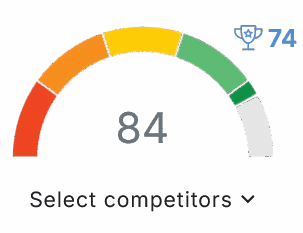You boost your rankings with NeuronWriter SEO by leveraging AI-driven semantic analysis that guarantees your content connects deeply with search intent and audience needs. It automates keyword research, competitor insights, and SEO-friendly heading creation, improving content quality and structure. The tool also strengthens internal linking and technical SEO, optimizing your site for better crawlability and user engagement. Keep exploring to uncover how these features work together to elevate your search performance.
Key Takeaways
- NeuronWriter enhances semantic relevance by analyzing context, synonyms, and related concepts for deeper content resonance with user intent.
- It automates SEO-friendly heading structures aligned with keyword intent, improving user engagement and compliance with Google’s ranking criteria.
- The tool supports competitor and SERP analysis to identify keyword opportunities, content gaps, and optimize for featured snippets.
- NeuronWriter integrates AI-driven content optimization, ensuring high-quality, clear, and actionable writing that builds audience trust.
- It facilitates internal linking and technical SEO audits, improving site structure, crawl efficiency, and overall user experience for better rankings.
Enhancing Semantic Relevance With NLP

Although traditional SEO focused on exact keywords, enhancing semantic relevance with NLP lets you connect with your audience by matching their search intent more accurately.
When you prioritize semantic coherence, your content reflects not just isolated terms but meaningful relationships between ideas. This helps you serve visitors who seek thorough answers rather than keyword-stuffed pages. The shift from keyword matching to semantic SEO has made this approach essential for modern content strategies. Additionally, NeuronWriter’s AI templates streamline the creation of content that resonates with user intent.
By understanding user intent, NLP-driven tools analyze context, synonyms, and related concepts to guarantee your message resonates deeply. You’ll naturally address implicit needs, improving engagement and trust.
Using entity recognition and topic clustering, you clarify your content’s role and relevance, making it easier for search engines to present your pages when they truly fit a searcher’s goal.
This approach empowers you to create helpful, intent-aligned content that genuinely supports your audience’s journey.
Leveraging Competitor and SERP Analysis
When you leverage competitor and SERP analysis, you uncover valuable insights that can sharpen your SEO strategy and boost your rankings. By examining competitor keyword usage, you identify gaps and prioritize high-impact terms tailored to your audience’s needs. Backlink analysis reveals authoritative domains linking to competitors, guiding your outreach to build valuable relationships and improve domain authority. Additionally, using tools like NeuronWriter for content optimization can enhance your ability to create engaging and relevant content. Regular competitor monitoring also helps you stay up-to-date with evolving SEO tactics and market shifts, ensuring your strategy remains relevant and effective (regular analysis).
| Focus Area | Key Benefit |
|---|---|
| Competitor Keyword | Discover untapped, high-volume terms |
| Backlink Analysis | Locate quality link-building targets |
| Content Strategy | Identify content gaps & opportunities |
| SERP Features | Optimize for snippets and local SEO |
This approach helps you serve your audience better by delivering relevant, authoritative content that ranks higher and meets their search intent.
Automating SEO-Friendly Heading Generation

Since crafting SEO-friendly headings can be time-consuming and complex, automating this process lets you save effort while guaranteeing your content aligns perfectly with search intent and ranking factors.
NeuronWriter uses AI to create automated heading structures that match keyword intent, boosting user intent alignment and engagement signal enhancement. This not only encourages deeper content exploration but also guarantees SEO compliance automation by adhering to Google’s ranking criteria. By leveraging AI-driven insights, it enhances user experience through personalized and relevant headings. Furthermore, its built-in SERP tracking allows for continuous optimization based on real-time performance data.
Additionally, it supports voice search optimization by generating natural, conversational headings and offers multilingual heading generation to reach diverse audiences effectively.
Improving Content Quality and Readability Scores
Automating SEO-friendly headings sets a strong foundation, but improving your content’s quality and readability truly keeps visitors engaged and satisfied.
You’ll want to focus on relevant keyword integration that aligns perfectly with search intent, ensuring your content serves your audience’s needs. This alignment is crucial because content quality is defined by its value and relevance to the intended audience. Regularly conducting keyword analysis can further optimize your writing strategy.
Prioritize clear, actionable writing that builds trust through expertise and real-world examples.
For readability enhancement, balance sentence length and complexity, use active voice, and avoid jargon. These steps make your content easier to scan and understand, boosting content engagement.
Regularly audit for clarity and conciseness to keep your message sharp.
Streamlining SEO Workflow Efficiency

To boost your SEO results effectively, you need a streamlined workflow that cuts down on repetitive tasks and maximizes productivity. NeuronWriter helps you achieve this by leveraging workflow automation to handle keyword research, on-page SEO checks, and performance tracking. This approach ensures SEO becomes a repeatable process with a clear checklist for every content piece. Additionally, leveraging AI-powered content optimization enhances your ability to create high-quality content that resonates with both search engines and readers.
This process optimization frees you to focus on creating content that truly serves your audience’s needs. With structured workflows breaking tasks into clear phases—audit, research, creation, optimization, and linking—you can prioritize high-impact activities and maintain consistency through recurring schedules.
Automated tools also enhance collaboration among your team, ensuring everyone aligns on deadlines and quality. By integrating data-driven insights and automating routine checks, you maintain an efficient SEO process that continuously adapts, helping you serve your audience better while boosting your site’s rankings.
Optimizing Title and Meta Descriptions for CTR
When you craft compelling title tags and meta descriptions, you greatly increase your chances of attracting clicks from search results.
Focus on a prime title length of 40-60 characters to boost your click-through rate by over 30%. Use action language like “Discover,” “Learn,” or “Get” in your meta descriptions to invite users to engage meaningfully with your content.
Make sure your titles carry a clear value proposition and place target keywords near the start to enhance relevance and readability. Keep meta descriptions concise, under 160 characters, aligning them with user intent.
Avoid vague or misleading titles that may erode trust. By thoughtfully optimizing title length and employing action language, you serve your audience better while improving your page’s visibility and engagement. Additionally, leveraging SEO principles as suggested by NeuronWriter can further enhance your content’s effectiveness in search rankings.
Strengthening Internal Linking Strategies

Here’s how effective internal linking supports your goals:
| Benefit | How It Helps |
|---|---|
| User Engagement | Reduces bounce rates, increases time on page |
| SEO Performance | Distributes link equity, boosts crawlability |
| Content Hierarchy | Builds clusters, clarifies site structure |
| Conversion Support | Bridges info gaps, supports user decisions |
Although internal linking often gets overlooked, it plays an essential role in boosting your site’s SEO and user experience. By strengthening your linking strategies, you guide visitors smoothly through your content hierarchy, helping them find related resources easily. This not only keeps users engaged longer but also signals search engines about your site’s structure and topical authority. Internal links also help distribute link equity across your pages, enhancing overall SEO performance. Additionally, NeuronWriter offers intelligent internal link suggestions that can significantly streamline this process.
Focus on thoughtful linking strategies to nurture your audience and enhance your site’s discoverability.
Integrating Technical SEO Best Practices
Since technical SEO directly impacts your site’s performance and search rankings, integrating best practices is essential for sustainable growth.
Start by conducting a thorough technical audit to identify issues like broken links, orphaned pages, and duplicate content. This helps you prioritize fixes that improve user experience and preserve link equity. Additionally, leveraging AI and NLP techniques can enhance your audit process by providing insights into keyword gaps and content alignment.
Next, focus on crawl optimization by managing your crawl budget—use XML sitemaps to highlight critical pages and optimize your robots.txt to allow essential resources while blocking unnecessary scripts.
Analyzing server log files reveals crawl frequency patterns, helping you fine-tune your strategy. Additionally, running tools like PageSpeed Insights can identify technical issues that impact loading speed and overall site performance. By addressing these technical elements diligently, you guarantee search engines can efficiently access and index your content.
This behind-the-scenes work forms a strong foundation, empowering your site to serve visitors better and climb search rankings steadily.
Maximizing Content Depth Through Keyword Clustering

By organizing related keywords into focused clusters, you can deepen your content’s relevance and improve its ability to satisfy various user intents on a single page. This approach enhances content organization, making it easier for your audience to find thorough answers while boosting user engagement. Keyword clustering also helps establish topical authority, which can lead to higher search engine rankings. Additionally, effective keyword clustering aligns with SEO best practices, ensuring that your content is optimized for both users and search engines.
NeuronWriter helps you group keywords by intent, creating clear, topic-specific clusters that cover multiple queries without overlap.
To maximize content depth, focus on:
- Targeting multiple related keywords to address diverse user needs
- Structuring content hubs that guide visitors naturally through topics
- Avoiding keyword cannibalization by assigning unique clusters to pages
This strategy not only improves SEO rankings but also serves your visitors better by delivering well-organized, detailed content that answers their questions effectively.
Frequently Asked Questions
Does Neuronwriter SEO Support Multiple Languages for International Websites?
You’ll appreciate NeuronWriter’s multilingual capabilities, letting you craft SEO content for international targeting effortlessly. It supports 170 languages, helping you connect authentically with diverse audiences and serve your global community effectively and respectfully.
Can Neuronwriter SEO Integrate With Popular CMS Platforms Like WordPress?
You’ll appreciate NeuronWriter SEO’s CMS compatibility, especially its seamless plugin functionality with popular platforms like WordPress. It helps you serve your audience better by simplifying content optimization directly within your preferred CMS environment.
How Does Neuronwriter SEO Handle Updates in Search Engine Algorithms?
Think of NeuronWriter as a lighthouse guiding your SEO ship through stormy algorithm seas. It guarantees algorithm adaptability by dynamically adjusting your SEO strategy, helping you serve your audience with content perfectly aligned to evolving search engine priorities.
Is There a Learning Curve for Beginners Using Neuronwriter SEO Tools?
You’ll face a learning curve with NeuronWriter’s user interface since it’s feature-rich. Fortunately, tutorial resources help you master tools quickly, empowering you to serve others effectively through optimized, impactful content creation.
What Customer Support Options Are Available for Neuronwriter SEO Users?
You’ll get email support with every plan, and if you choose Silver or Gold, you can use live chat for quicker help. Plus, there’s a supportive Facebook community and instructional videos to guide you along.
Conclusion
So, you might think boosting your SEO rankings requires a PhD in rocket science, right? Well, with NeuronWriter, it’s almost as easy as breathing. It smartly enhances your content’s relevance, automates tedious tasks, and even fine-tunes your meta descriptions without breaking a sweat. If only all SEO tools were this effortless, you’d be ranking on page one while sipping your coffee—no miracles needed, just some smart tech doing the heavy lifting for you.
References
- https://optiwebdesign.com/2024/10/23/advanced-techniques-in-neuronwriter/
- https://neuronwriter.com/blog/how-neuronwriter-transforms-your-content-from-hidden-gem-to-search-engine-magnet/
- https://busymomsidehustle.com/neuronwriter-review/
- https://www.kristian-larsen.com/reviews/neuronwriter-review/
- https://neuronwriter.com/blog/optimizing-seo-content-with-nlp-a-content-strategy-with-neuronwriter/
- https://wildfireseo.co.za/2025/03/31/how-nlp-affects-rankings-for-seo-firms/
- https://www.ranktracker.com/blog/semantic-relevance-in-seo/
- https://iloopworld.com/semantic-seo-vs-natural-language-processing-google-rankings/
- https://clickstream.cc/semantic-research-analysis-and-modeling-for-seo/
- https://www.reachfirst.com/impact-nlp-based-seo-rankings/


